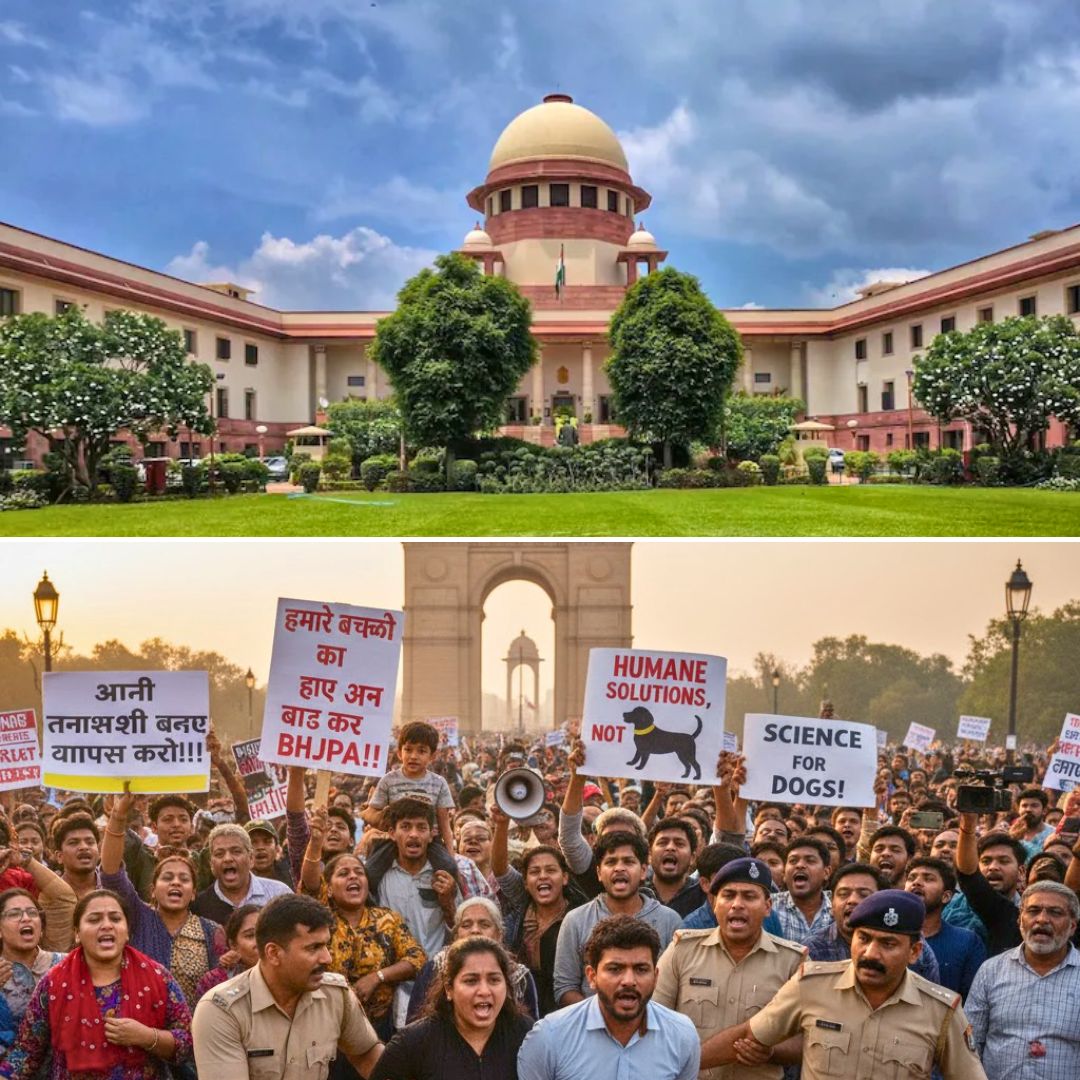On 9 November 2025, a large protest unfolded at India Gate, Delhi, against the Supreme Court’s recent directive to remove stray dogs from sensitive public spaces such as schools, hospitals, bus stands, and railway stations across the country.
Citizens, including anguished parents and passionate animal rights activists, expressed fierce opposition to the order, chanting slogans like “Hamare bacho ka haq unhe waapis karo!!! Apni tanashahi band kar bh@dwa j@nata p@rty!!!”
The protesters condemned what they termed an unscientific and harsh policy, demanding that authorities consider humane alternatives and stop what they see as the government’s authoritarian measures.
Police detained several demonstrators to maintain law and order around this national landmark, highlighting the polarization and rising tensions these directives have caused on the ground.
Rising Concerns Spark Supreme Court Intervention
The Supreme Court took suo motu cognisance of the alarming increase in dog-bite cases, with over 1.7 million incidents reported nationwide in 2024 alone.
The court’s three-judge bench, comprising Justices Vikram Nath, Sandeep Mehta, and NV Anjaria, highlighted that children, hospital patients, and economically disadvantaged individuals are the worst affected by stray dog attacks, framing the issue as a matter of life and liberty under Article 21 of the Constitution.
In response, the apex court ordered state governments and municipal authorities to prevent stray dogs from entering sensitive public spaces by fencing educational, health, and institutional premises and physically removing the animals.
The dogs are to be sterilised and vaccinated according to updated Animal Birth Control (ABC) Rules of 2023, then relocated to secure shelters without release back into the community to prevent cyclical re-population of aggressive animals.
The legal directive is strict: it demands comprehensive compliance within a few weeks, with state Chief Secretaries held personally accountable for lapses. It also mandates regular inspections of institutional premises to ensure continued absence of stray dogs.
The court warned that any individuals or groups obstructing the official dog-catching drives could face contempt proceedings or harsher consequences, signalling a no-tolerance approach to enforcement.
Voices from the Protest: Safety, Welfare, and Social Equity
Despite the court’s insistence on protecting public health, the order has sparked substantial public backlash, particularly reflected in the large protest held at India Gate on 9 November 2025.
Protesters included parents fearful for their children’s safety around stray dogs, but animal welfare advocates and local residents expressed strong opposition to mass removal and relocation policies. Many insisted that the approach was unscientific, inhumane, and would create new problems rather than solve existing ones.
Critics argued that purely removing dogs without ensuring their humane sterilisation, welfare, and community reintegration would disrupt ecological balance, leading to an influx of new, potentially more aggressive dogs filling territorial vacuums.
They appealed for evidence-based, compassionate interventions emphasizing scientific methods like Catch-Neuter-Vaccinate-Release (CNVR), which had been partially endorsed in earlier court rulings.
Protesters’ slogans voiced anger not just at the order but at government perceived indifference, dubbing the enforcing party a “tanashahi” (dictatorship) against public sentiment.
Parents also linked the increase in dog bite cases to broader issues, including rising pollution and the lack of proper urban infrastructure, arguing that stray dog problems were symptoms of systemic neglect rather than causes.
The police detained several protesters on grounds of security near a sensitive national monument during a period close to Independence Day celebrations, further intensifying tensions.
Official Position and Implementation Challenges
The Supreme Court has remained firm that public safety, especially for children and vulnerable citizens, must be paramount. It directed the creation of new shelters capable of housing thousands of dogs and staffed with veterinary professionals dedicated to ongoing sterilisation and vaccination.
The court mandated fencing of institutional properties and the appointment of nodal officers at each facility to ensure effective coordination with municipal bodies.
Officials have been quick to assert readiness to implement the orders, but many have acknowledged challenges including insufficient infrastructure, shortage of trained staff for humane capture, and ethical concerns raised by animal rights organisations.
The court appointed Amicus Curiae Gaurav Agrawal submitted reports highlighting compliance gaps and urged remedial measures to be swiftly undertaken.
Some states have submitted affidavits detailing progress, while others lag behind, risking legal consequences for inaction or lethargy.
The Supreme Court emphasized that these are public health orders, not merely animal control measures, and stressed that any failure to comply seriously would be met with strict judicial remedies.
Legal and Ethical Debates Surrounding the Order
The ongoing discourse also encompasses legal and ethical complexities. Earlier rulings allowed captured stray dogs to be sterilised and vaccinated then returned to their original habitats, a model supported by scientific evidence pointing to balanced ecological outcomes.
The Supreme Court’s recent hardline shift to no-release policies marks a departure motivated by escalating public safety concerns.
Animal rights groups argue that forcible relocations risk undue stress, suffering, and mortality among dogs without addressing root causes such as urban planning deficiencies and community awareness.
Conversely, advocates for stricter measures stress the urgency of preventing fatal dog bites, noting that thousands of people in India die annually from rabies transmitted by free-ranging dogs.
This judicial balancing act reflects a larger governance dilemma-how to equitably protect human health and safety without undermining animal welfare and community harmony.
Municipalities face operational hurdles in building sufficient shelters and managing stray populations sustainably. Furthermore, social acceptance varies widely, complicating law enforcement and public messaging.
The Logical Indian’s Perspective
The Logical Indian believes that public safety is non-negotiable, yet protection must be grounded in empathy, science, and respect for all sentient beings sharing our urban spaces. Children deserve safe environments free from danger, but the means to achieve this must avoid cruelty or authoritarianism.
Harmonious coexistence requires policies developed through inclusive dialogue involving community members, animal welfare experts, legal authorities, and healthcare professionals.
Strict measures, if necessary, should be executed with maximum transparency and sensitivity, backed by investments in infrastructure and education to prevent conflicts.
This situation invites a reflection on broader urban governance challenges-how cities accommodate and manage the complex needs of human and animal inhabitants alike.











